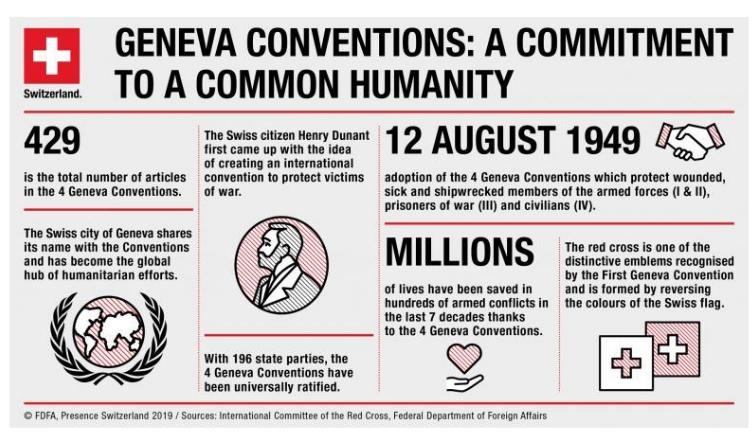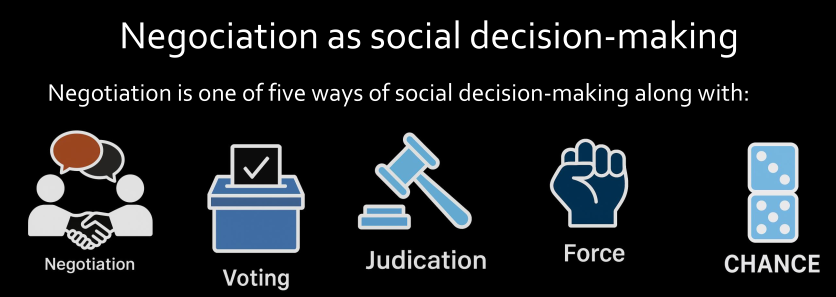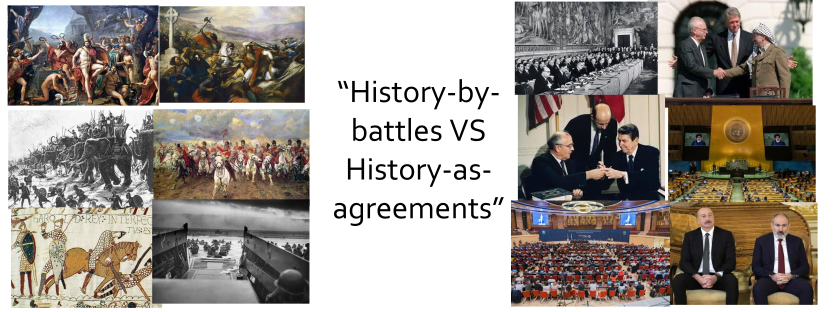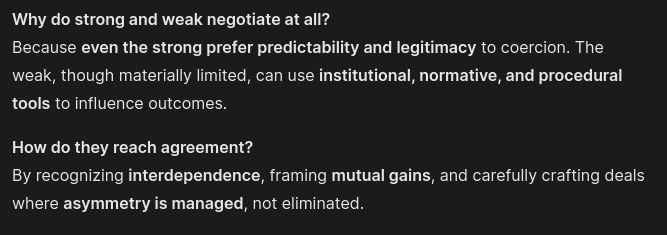Introduction
International Geneva
Geneva hosts an immense number of IOs, NGOs, conferences, etc. Despite lack of funding and the existence cheaper countries that could host them, they keep coming to Geneva because of the already existing ecosystem that reduces transactional costs and keeps showing its efficiency.
To the UN, NYC is the restaurant and Geneva is the kitchen.
Geneva serves as the hub for multilateral problem solving and global governance, while NYC hosts a high-level political theatre.
Origins
This tradition was first brought to Geneva by the Geneva Conventions and the ICRC.

What is negotiation
- Negotiation is the process of combining divergent/conflicting viewpoints to produce a common agreement.
- A theory never happens in a vacuum→there is always a debate, in this case a negotiation, to reach a conclusion. They have to talk to each other, underlining how they are wrong.
- Negotiation means giving something to get something. It is the process of determining the price and the currency in a barter, where both the purchase and the price are indeterminate and must be brought into concordance with each other (Zartmann 2008, Ch.1).
- We talk about a process here because negotiation is one whose objective is to make a decision. This always happens in an interdependent way. Others impact the process, which impacts the outcome (decision). Such is the base of social decision-making.
- An interdependent, dynamic decision-making process in which parties discuss and change/adapt their strategies in response to each other (Fisher & Ury 1999).
 As for force, war is the continuation of politics by other means. When you do not get what you want in negotiation you force the desired result using violence. In the case of judication, it is the state (using its monopoly of violence) who makes and enforces the decision.
As for force, war is the continuation of politics by other means. When you do not get what you want in negotiation you force the desired result using violence. In the case of judication, it is the state (using its monopoly of violence) who makes and enforces the decision.
Social decision-making trough chance refers to practices such as flipping a coin.
IRs is a field long dominated by force, which recently made a comeback after being briefly overshadowed by negotiation and judication (the age of international laws and the United Nations).
Accessory notions
Multiple concepts are often associated to negotiation, but are not the same thing:
- Mediation: a structured process in which a third party assists the parties in a conflict to reach an agreement through negotiation and dialogue. The mediator : coaches the process along and may propose solutions but does not have the authority to impose a settlement. While the degree of acceptance by the parties can vary – and can also be the result of external pressure – mediation ultimately relies on the acceptance of the parties of the mediator and the final settlement. The attraction of mediation lies to a large degree in its voluntary nature. (Wesslau 2013).
- Qatar/Gaza.
- Switzerland/Georgia.
- Dialogue: A (diplomatic) dialogue process entails a series of meetings between two or more actors across the conflict lines with the intention of exchanging perceptions and building understanding and trust. Dialogue does not primarily aim at decisions and implementable action. (Pruitt &Thomas 2007).
- Often more acceptable and seen as less intrusive than other terms.
- Can lead to mediation/negotiation.
- Good offices: Generally refers to the efforts of a neutral third party in setting up a channel between two conflict parties, so that they can communicate again, to solve their conflicts directly (Trachsler 2004).
- Messenger role: mediation, arbitration, hosting international conferences, or representing the interests of a foreign country (protecting power mandate)…
- Switzerland/Iran & USA.
Importance
Too little attention is devoted to analyzing and understanding the process of negotiation (Zartmann).
 Most decisions in history were not taken purely using force. However this is not incorporated enough in our current vision of history.
Most decisions in history were not taken purely using force. However this is not incorporated enough in our current vision of history.
Negotiation is necessary, it reduces war by humanising our enemies. Recently it has been seen as the weapon of the weak, but it has shown it can result in win-win situations and save many lives in the process.
The shadow of Realism
The (still) dominant international relations paradigm of realism can only explain conflict, not its resolution or cooperation, and has no place for negotiation:
- Traditional study of International Relations focuses on power, authority, war and security.
- Less on Peace and conflict management (Liberalism and constructivism).
- And even less on the processes leading to a negotiation…
Structuralist’s paradox
How and why do the weak and strong negotiate in order to come to a mutually acceptable agreement, and why do they do so anyhow, if the strong is strong and the weak is weak? (Zartmann 2008, Chap. 6)
- Ex: Swiss-EU Bilateral agreements
- Switzerland is outside of the EU but got a good deal. Even if the EU can seem stronger, both strong and weak actors seem to have incentives to negotiate.

- Switzerland is outside of the EU but got a good deal. Even if the EU can seem stronger, both strong and weak actors seem to have incentives to negotiate.
This idea has been challenged by the return of power politics such as those of the new USA administration.
How to study negotiation?
There are many different approaches, and it might be difficult to navigate the debate so as to situate yourself and the other theorists.
- Strong diplomatic belief that skill only comes by doing (Negotiation as a craft).
- Negotiation as skills? empathy, inter-cultural skills,knowledge of the political context, pragmatism→practice.
- Or as something predictable?
- Studying many wars could allow you to understand individual ones better, classify and predict them→science.
- How can we predict negotiation?
- A more systematic study of negotiation processes emerged in the field of economy with the emergence of Game theory.
- Emerged during the Cold War, when negotiation was very important and the cost of war surpassed that of negotiation.
- Big interest for prediction, high stakes.
- Since diplomacy taught it as skills and experience, the field of economics went for a more mathematical approach.
- But it is often disconnected from any consideration of process as practised in negotiation.
- Less centred in the human aspect.
- Emerged during the Cold War, when negotiation was very important and the cost of war surpassed that of negotiation.
What about theory?
A divide between theory and practice. Theoretical theory is on the rise. People in the field think they know what they do because of their experience opposed to people that study negotiation and don’t get why the same mistakes are made (from their point of view, a consequence of lack of studying):
- How to reconcile the study of negotiation from simple characteristics of a good negotiator and idealised theory distant from the real process?
- The Strategy of Conflict of Thomas G. Schelling (1960) constitutes one of the first attempts to combine study of power and process in negotiations.